 The intro here is no news – Episode 7 is another wondrous outing for Seirei no Moribito. It may in fact be my favorite of the series to this point, but the problem is that by the time it’s over there are about a dozen I could say that about and choosing between them is like choosing between my children (if I had any).
The intro here is no news – Episode 7 is another wondrous outing for Seirei no Moribito. It may in fact be my favorite of the series to this point, but the problem is that by the time it’s over there are about a dozen I could say that about and choosing between them is like choosing between my children (if I had any).
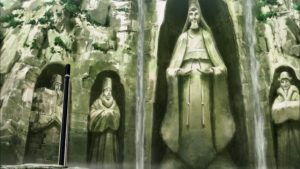 The thing that really stands out about this ep in hindsight is that it was the first one where Kamiyama Kenji really began to make Seirei no Moribito the anime his own distinct creation. There are a lot of changes from the novel to the anime (reportedly Uehashi Nahoko was kept in the loop and signed on), but they’re most telling in this middle portion of the series. The backstory of Balsa and Chagum’s relationship and life together is vastly more developed in the anime, which means Tanda’s role in this new family is as well. Since for me this is probably the best part of the series that’s a huge change for the better – and having read the translated novels now, I feel that more strongly than ever.
The thing that really stands out about this ep in hindsight is that it was the first one where Kamiyama Kenji really began to make Seirei no Moribito the anime his own distinct creation. There are a lot of changes from the novel to the anime (reportedly Uehashi Nahoko was kept in the loop and signed on), but they’re most telling in this middle portion of the series. The backstory of Balsa and Chagum’s relationship and life together is vastly more developed in the anime, which means Tanda’s role in this new family is as well. Since for me this is probably the best part of the series that’s a huge change for the better – and having read the translated novels now, I feel that more strongly than ever.
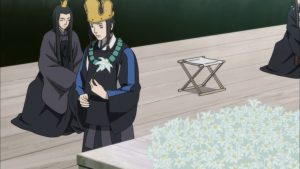 This is also where some of the viewers who were drawn in by the more action-driven episodes began to see Moribito as falling short when held up to a conventional anime metric. “Nothing happened” was a complaint I heard lodged against some of these middle episode, including this one. The problem is, you could hardly imagine a less conventional anime than Seirei no Moribito. Thank God Kamiyama wasn’t interested in making allowances for convention – it seems clear he told the story he wanted to tell, with minimal interference from anyone outside the creative process. Even in 2007 that was miraculous in anime – nowadays it seems entirely impossible.
This is also where some of the viewers who were drawn in by the more action-driven episodes began to see Moribito as falling short when held up to a conventional anime metric. “Nothing happened” was a complaint I heard lodged against some of these middle episode, including this one. The problem is, you could hardly imagine a less conventional anime than Seirei no Moribito. Thank God Kamiyama wasn’t interested in making allowances for convention – it seems clear he told the story he wanted to tell, with minimal interference from anyone outside the creative process. Even in 2007 that was miraculous in anime – nowadays it seems entirely impossible.
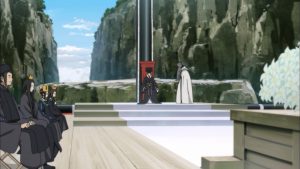 How anyone could watch this episode and say “nothing happened” is utterly and totally beyond me. Immense amounts of stuff happened – world building and character development is as far from nothing as you can get, especially with a story this profound. Between the writing, visuals, and music the emotional power of watching these mundane events play out was off the charts. It’s incredibly subtle and incredibly deep, this three-way character web, and you just grow to love these wonderful people so much. All three of them are beautiful souls, and it only makes what happens later in the story that much more painful.
How anyone could watch this episode and say “nothing happened” is utterly and totally beyond me. Immense amounts of stuff happened – world building and character development is as far from nothing as you can get, especially with a story this profound. Between the writing, visuals, and music the emotional power of watching these mundane events play out was off the charts. It’s incredibly subtle and incredibly deep, this three-way character web, and you just grow to love these wonderful people so much. All three of them are beautiful souls, and it only makes what happens later in the story that much more painful.
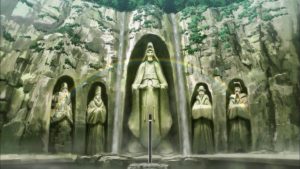 From the moment the Yakue proprietress brought out the Gisho – the three-bean “celebration” dish – to Tanda, the waters were running deep indeed. One of the sheer joys of this episode is just watching these characters in silent moments. Chagum is voraciously observing everything around him, trying to process this kaleidoscope of sensory data and new concepts. Meanwhile, Balsa is always watching Chagum – sometimes inscrutably, but sometimes a little smile will creep onto her face and we can tell exactly what she’s thinking. It’s the blossoming of love – maternal love of a woman who isn’t a mother for a boy who isn’t her child.
From the moment the Yakue proprietress brought out the Gisho – the three-bean “celebration” dish – to Tanda, the waters were running deep indeed. One of the sheer joys of this episode is just watching these characters in silent moments. Chagum is voraciously observing everything around him, trying to process this kaleidoscope of sensory data and new concepts. Meanwhile, Balsa is always watching Chagum – sometimes inscrutably, but sometimes a little smile will creep onto her face and we can tell exactly what she’s thinking. It’s the blossoming of love – maternal love of a woman who isn’t a mother for a boy who isn’t her child.
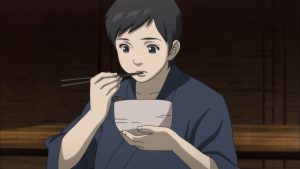 This is where the reality of the situation begins to sink in. For Balsa this is unlike any other job, because it doesn’t end – she’s stuck with Chagum, but is becoming glad of it. She’s transitioning from a yojimbo to a true guardian, and that means she has to think about the rest of her life. Just as Jiguro did, when he took her from Kanbal to Yogo. But for Chagum, this is all troubling. It’s not that he doesn’t already love Balsa – of course he does. But this boy is whip-smart, and as he takes in the reality of the commoner – having to pay rent, for example – he begins to see the burden his existence places on Balsa. Especially as she’s already spent most of the treasure his mother gave her to assist in protecting him.
This is where the reality of the situation begins to sink in. For Balsa this is unlike any other job, because it doesn’t end – she’s stuck with Chagum, but is becoming glad of it. She’s transitioning from a yojimbo to a true guardian, and that means she has to think about the rest of her life. Just as Jiguro did, when he took her from Kanbal to Yogo. But for Chagum, this is all troubling. It’s not that he doesn’t already love Balsa – of course he does. But this boy is whip-smart, and as he takes in the reality of the commoner – having to pay rent, for example – he begins to see the burden his existence places on Balsa. Especially as she’s already spent most of the treasure his mother gave her to assist in protecting him.
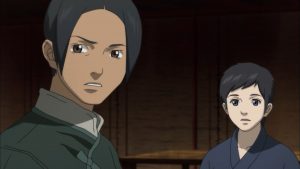 I love that mill house to an irrational degree, as anyone who’s read my Moribito sequel knows. In addition to being gorgeously depicted (this is another episodes full of astonishingly beautiful backdrops), it seems to represent Balsa and Chagum’s bond in a very profound way. As Tanda spends too much to make too splendid a supper for his “family”, Chagum – as naive as he is intelligent – tries to give Balsa his mother’s earring and declare that she and Tanda are free from having to care for him. It’s a fitting gesture, perfectly in-line with his nature, but what he comes to realize is that it’s the last thing in the world Balsa and Tanda want.
I love that mill house to an irrational degree, as anyone who’s read my Moribito sequel knows. In addition to being gorgeously depicted (this is another episodes full of astonishingly beautiful backdrops), it seems to represent Balsa and Chagum’s bond in a very profound way. As Tanda spends too much to make too splendid a supper for his “family”, Chagum – as naive as he is intelligent – tries to give Balsa his mother’s earring and declare that she and Tanda are free from having to care for him. It’s a fitting gesture, perfectly in-line with his nature, but what he comes to realize is that it’s the last thing in the world Balsa and Tanda want.
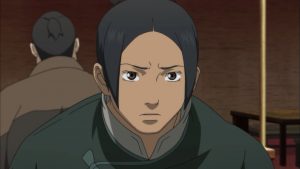 Balsa’s dialogue here is some of my favorite of the entire series. “Baka da ne… You can stay here as long as you like. That’s what I promised your mother, remember? And besides – there are lots of people in this world who couldn’t abandon a boy like you even if they weren’t getting paid.” I can’t even begin to describe how many layers are packed into those words. First Balsa reassures Chagum that she’s still within the bounds of her job – but what she says next is “You’re special. And I wouldn’t give this up for anything – this is my choice.” In her gruff and understated way Balsa is capable of an eloquence that’s as remarkable as her prowess with the spear.
Balsa’s dialogue here is some of my favorite of the entire series. “Baka da ne… You can stay here as long as you like. That’s what I promised your mother, remember? And besides – there are lots of people in this world who couldn’t abandon a boy like you even if they weren’t getting paid.” I can’t even begin to describe how many layers are packed into those words. First Balsa reassures Chagum that she’s still within the bounds of her job – but what she says next is “You’re special. And I wouldn’t give this up for anything – this is my choice.” In her gruff and understated way Balsa is capable of an eloquence that’s as remarkable as her prowess with the spear.


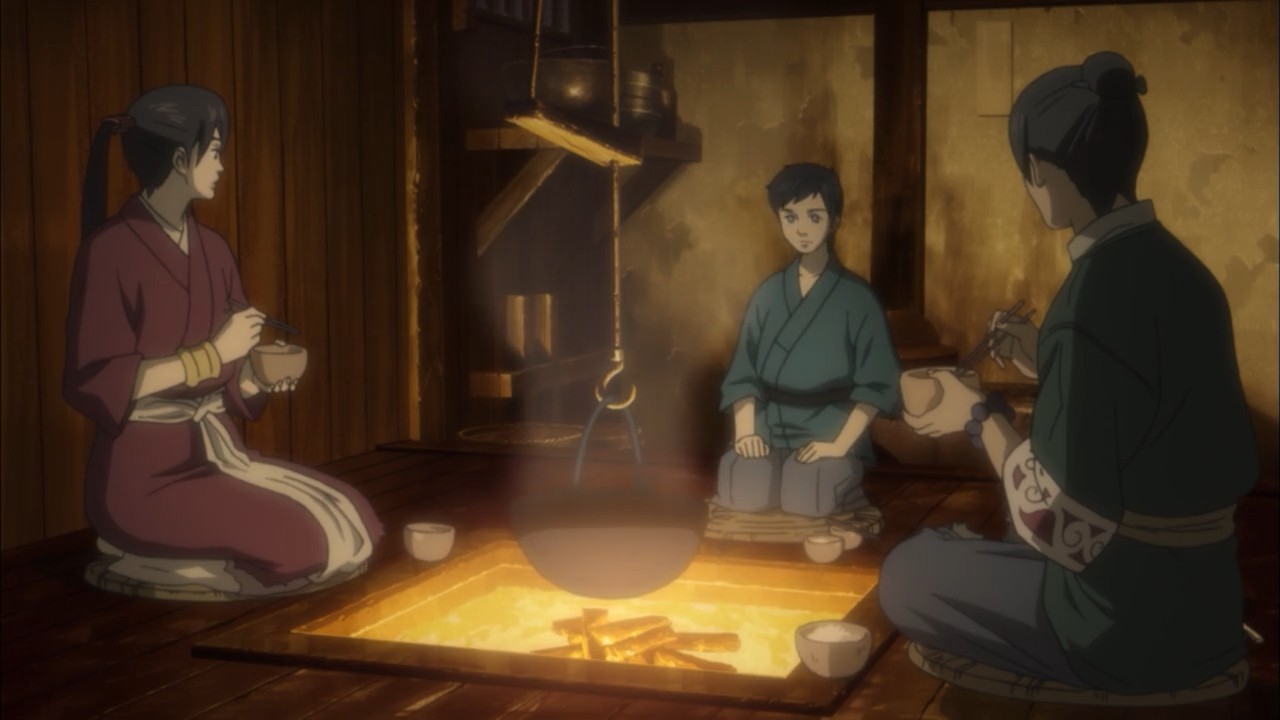
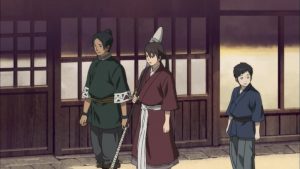
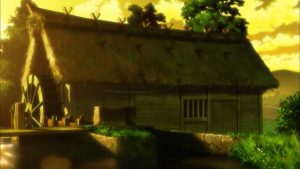
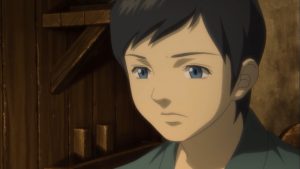
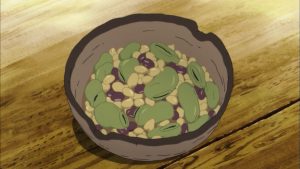
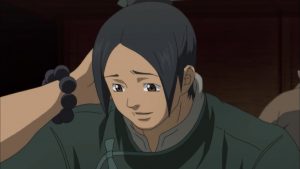
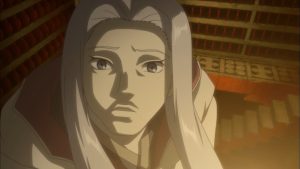
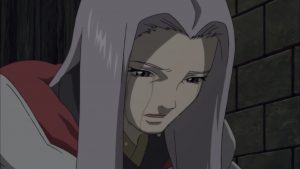
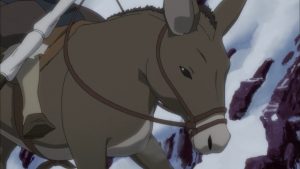

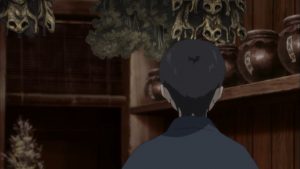
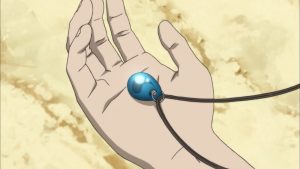
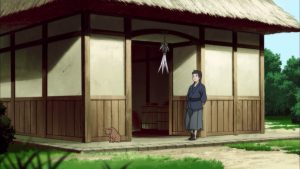
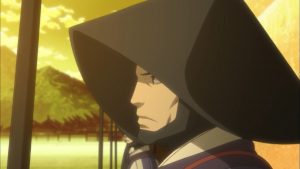
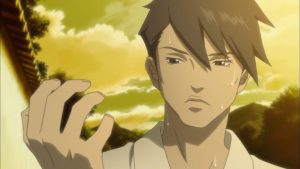
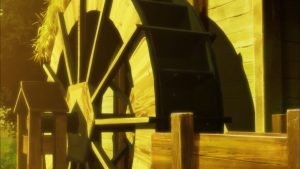
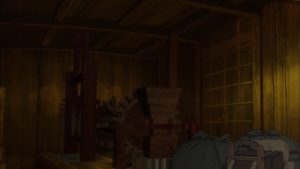
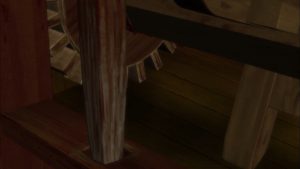
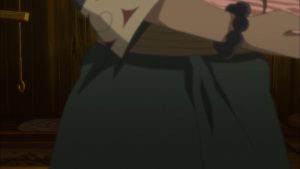
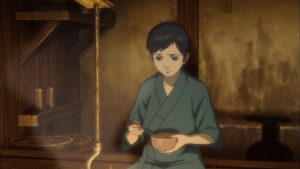
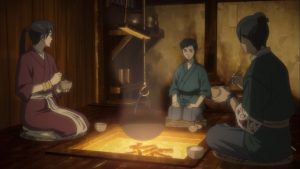
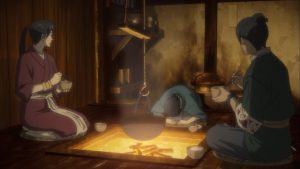
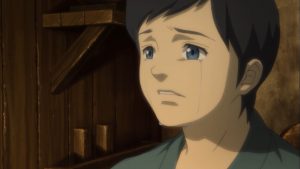
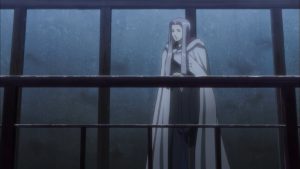
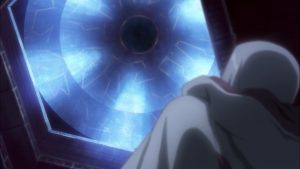


Panino Manino
May 22, 2020 at 11:08 amI fear that I will repeat this every time you publish a new episode review, but always marvels me how convincing this world is. Each year I watch less and less anime, so I don’t actually know how current anime compares in this respect, but it’s a joy to watch all those people walking the streets. They don’t look like soulless 3D models just to give the impression that the cities are not empty, there’s a noticeable effort to make all the background people seems like their own characters minding their daily business.
This anime is so good!
– Chagum’s father is only the sixth Emperor? History was forgotten fast!
– I get Balsa’s point, but really, she shouldn’t be walking the streets with what it’s clearly a spear without concern.
– When I see Balsa taking and eating that big bean that represents the father I want to give a big hard hug on Tanda…
– Chagum is almost unbelievable good. Really good and honest education they give in that palace.
– That countryside is so comfy!
Also, watch faster!
Guardian Enzo
May 22, 2020 at 11:36 amSpoiler: it doesn’t compare very well in that or any other respect. But this is an incredibly high bar.
Regarding Chagum’s education… I think we can presume that Shuga is a good influence here, being a principled and kind person himself (though as young as he is, who knows for how long he’s been Chagum’s tutor). Sagum too seems like a good lad, so on some level I think it’s clear this palace teaches its princes well – but I also think we can assume that Chagum is exceptionally kind and empathetic (and clever). Some people are, and he’s one of them.
Panino Manino
May 23, 2020 at 1:43 amHum… yes, Chagum’s education in the Palace didn’t made him “good”, but probably made him “better”.
The way he was teach to be level headed, control his emotions, and behave properly will help him now that he is living in the wild. I remember that this helped him to get the upper hand in situations where common kids would be overwhelmed and could not escape just being “smart” as Toya.
Zol
May 22, 2020 at 5:39 pmI have to admit I was one of those people that originally thought of the middle part of the series as “filler”. I liked it, but the second half of the series (from episode 14 and even more so episode 18 onwards) was always my favourite part. And while this last aspect didn’t change, after rewatching it recently I know appreciate these “quieter” episodes a lot more than I used to. They help enormously in building the characters up and making the viewer understand their motivations and thus relate to them.
Jana
May 22, 2020 at 8:28 pmi Love you Blog Post it Helped me Alot :3 hope more post like this Please.
Regards Jana From
SilvLining.com